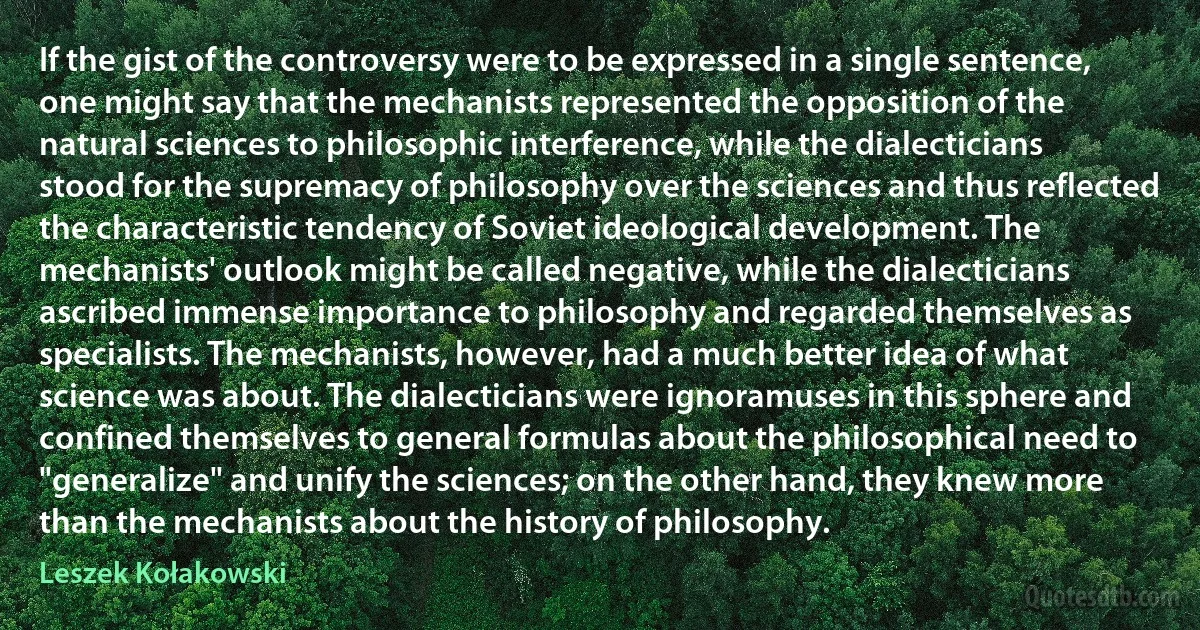
If the gist of the controversy were to be expressed in a single sentence, one might say that the mechanists represented the opposition of the natural sciences to philosophic interference, while the dialecticians stood for the supremacy of philosophy over the sciences and thus reflected the characteristic tendency of Soviet ideological development. The mechanists' outlook might be called negative, while the dialecticians ascribed immense importance to philosophy and regarded themselves as specialists. The mechanists, however, had a much better idea of what science was about. The dialecticians were ignoramuses in this sphere and confined themselves to general formulas about the philosophical need to "generalize" and unify the sciences; on the other hand, they knew more than the mechanists about the history of philosophy.
Leszek KołakowskiRelated topics
characteristic controversy development general gist hand history idea interference might natural need outlook say science single stand supremacy tendency thus while sciencesRelated quotes
The animating purpose of James was, on the other hand, primarily moral and artistic. It is expressed in his phrase, "block universe," employed as a term of adverse criticism. Mechanism and idealism were abhorrent to him because they both hold to a closed universe in which there is no room for novelty and adventure. Both sacrifice individuality and all the values, moral and aesthetic, which hang upon individuality; for according to absolute idealism, as to mechanistic materialism, the individual is simply a part determined by the whole of which he is a part. Only a philosophy of pluralism, of genuine indetermination, and of change which is real and intrinsic gives significance to individuality. It alone justifies struggle in creative activity and gives opportunity for the emergence of the genuinely new.

John Dewey
Climbing the bole of the tree, a man clings with all his arms and legs, and lays hold of every knob and sliver. When he mounts amongst the branches, it should be with a more easy alacrity. A man will often be apt at the one operation, yet awkward at the other. Nor is it, indeed, common to meet with a man of such a character as can be carried from a low condition of life through successive ascents, with an aptitude for every condition into which he passes; and thus it is that men who rise well will often stand infirmly. But for want of due consideration being given to the nature of men and circumstances, it is a usual thing to hear, not only regret but surprise expressed, when a man who has attained an elevated position in life exhibits in that position those very defects of character through which he is there.

Henry Taylor
This investigation aims to analyze the type "bourgeois public sphere". Its particular approach is required, to begin with, by the difficulties specific to an object whose complexity precludes exclusive reliance on the specialized methods of a single discipline. Rather, the category. "public sphere" must be investigated within the broad field formerly reflected in the perspective of the traditional science of "politics."' When particular social-scientific discipline, this object disintegrates. The problems that result from fusing aspects of sociology and economics, of constitutional law and political science, and of social and intellectual history are obvious: given the present state of differentiation and specialization in the social sciences, scarcely anyone will be able to master several, let alone all, of these disciplines.

Jürgen Habermas
Were we required to characterise this age of ours by any single epithet, we should be tempted to call it, not an Heroical, Devotional, Philosophical, or Moral Age, but, above all others, the Mechanical Age. It is the Age of Machinery, in every outward and inward sense of that word; the age which, with its whole undivided might, forwards, teaches and practises the great art of adapting means to ends. Nothing is now done directly, or by hand; all is by rule and calculated contrivance. For the simplest operation, some helps and accompaniments, some cunning abbreviating process is in readiness. Our old modes of exertion are all discredited, and thrown aside. On every hand, the living artisan is driven from his workshop, to make room for a speedier, inanimate one. The shuttle drops from the fingers of the weaver, and falls into iron fingers that ply it faster.

Thomas Carlyle
Deeply as many people deplored the policy which at a critical moment in European history gave Hitler a free hand in the East to develop his ambitious schemes of domination, strongly opposed as we were to many features of the Soviet system, we had no hesitation in proclaiming that as enemies of our enemies we should do all we could to help the Russian people in their fight... It was not unlikely that Hitler hoped to be able to launch from Moscow a great peace offensive. He would like to proclaim himself the saviour of Europe from Bolshevism... He would deceive no one in the Government. The great mass of the people in this country and in the countries of the British Commonwealth and Empire would not be deceived. We would not make peace with the Nazi gang because such a peace would be no peace. It would be a betrayal of everything for which this country stood.

Clement Attlee
